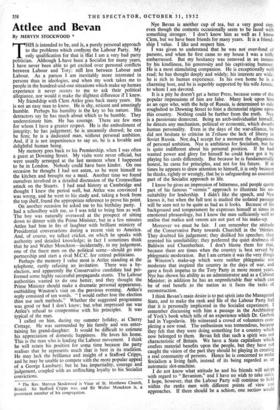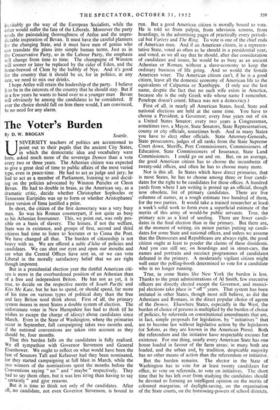Attlee and Bevan By MERVYN STOCKWOOD * T HIS is intended
to be, and is, a purely personal approach to the problems which confrpnt the Labour Party. My only qualification for that is licit I am a very bad party politician. Although l• have been.. a Socialist for many years, I have never been able to get excited over personal conflicts between Labour and Tory; still less between Labour and Labour. As a parson I am inevitably more interested in persons than in ideologies, and when my work takes me to people in the hundred-and-one situations which make up human experience it never occurs to me to ask their political allegiance, nor would it make the slightest difference if I knew.
My friendship with Clem Attlee goes back many years. He is not an easy man to know. He is shy, reticent and amazingly humble. Perhaps his humility is the key to his nature. His detractors say he has much about which to be humble. They underestimate him. He has courage. There are few men for whom I have a greater respect. He is the embodiment of integrity; he has judgement; he is, uncannily shrewd; he can be firm; he is a dedicated man, without personal ambition. And, if it is not impertinence to say so, he is a lovable and delightful human being. My memory goes back to his Premiership, when I was often a guest at Downing Street. My visits were never official, but were usually arranged at the last moment when I happened to be in London. Nobody could have been kinder. On one occasion he thought I had not eaten, so he went himself to the kitchen and brought me a meal. Another time we found ourselves involved in a detailed discussion of the Cromwellian attack on the Stuarts. I had read history at Cambridge and thought I knew the period well, but Attlee was convinced I was wrong, and he went to his study and, taking a book from the top shelf, found the appropriate reference to prove his point. On another occasion he asked me to his birthday party. I had a schoolboy with me, so I was told to bring him as well. The boy was naturally overawed at the prospect of sitting down to dinner with the Prime Minister, but in a few minutes Attlee had him in fits of laughter with brilliant mimicry of Presidential conversations during a recent visit to America. And, of course, we talked cricket, on which he speaks with authority and detailed knowledge; in fact I sometimes think that he and Walter Monckton—incidentally, in my judgement, one of the finest men on the political scene—should go into partnership and start a rival M.C.C. for retired politicians. , Perhaps the memory I value most is Attlee standing at the telephone, curtly refusing an invitation. There was a by- election, and apparently the Conservative candidate had per- formed some highly successful propaganda stunts. The Labour authorities wanted to do one better, and they thought the Prime Minister should make a dramatic personal appearance, outbidding Winston's visit on the previous evening. Attlee's reply consisted of ten words. " I would rather lose the election than use such methods." Whether the suggested programme was good or bad I don't know; but what impressed me was Attlee's refusal to compromise with his principles. It was typical of the man. I called on him, during my summer holiday, at Cherry Cottage. He was surrounded by his family and was, enter- taining his grand-daughter. It would be difficult to estimate his appreciation of domestic happiness. He loves his home. This is the man who is leading the Labour movement. I think he will retain his position for some time because the party realises that he represents much that is best in its tradition. He may lack the brilliance and insight of a Stafford Cripps, and he may be unable to compete with the more popular appeal of a George Lansbury; but he has impartiality, courage and judgement, coupled with an unflinching loyalty to his Socialist convictions.
• The Rev. Mervyn Stockwood is Vicar of St. Matthews Church, Bristol. Sir Stafford Cripps was, and Sir Walter Monckton is, a prominent member of his congregation.
Nye Bevan is another cup of tea, but a very good cup, even though the contents occasionally seem to be laced with something stronger. I don't know him as well as I know Clem, but we have been friends for many years. It is a friend- ship I value. I like and respect him. I was given to understand that he was not over-fond of parsons, and when he first came to my house I was a trifle embarrassed. But my hesitancy was removed in an instant by his kindliness, his generosity and his captivating humour. He is a most stimulating companion. He is exceptionally well read; he has thought deeply and widely; his interests are wide; he is rich in human experience. In his own home he is a charming host, and he is superbly supported by his wife Jennie, to whom I am devoted.
It is a pity he doesn't get a better Press, because some of the popular impressions of him are false. Many look upon him as an ogre who, with the help of Russia, is determined to ride roughshod to Downing Street to foist a dictatorial regime upon this country. Nothing could- be further from the truth. Nye is a passionate democrat. Being an arch-individualist himself, he detests any mechanism, political or economic, which dwarfs human personality. Even in the days of the war-alliance, he did not hesitate to criticise in Tribune the lack of liberty in Soviet Russia. Nov,,do, I accept for a moment the allegations of personal ambition. Nye is ambitious for Socialism, but he is quite indifferent about his personal position. If he had wanted power and glory for himself he could have got it by playing his cards differently. But because he is fundamentally honest, he cares for, principles, and not for his future. if at times he appears to draw attention to himself, it is only because he thinks, rightly or wrongly, that he is safeguarding an essential part of the Socialist approach to life.
I know he gives an impression of bitterness, arid people quote part of his famous " vermin " approach to illustrate his un- suitability for leadership. I didn't like the speech, and Nye knows it, but when the full text is studied the isolated passage will be seen not to be quite as bad as it looks. Because of his background and temperament he expresses himself at times in emotional phraseology, but I know the man sufficiently well to realise that malice and venom are not part of his make-up.
Moreover we must be fair. I can remember the attitude of the Conservative Party towards Churchill in the 'thirties. They doubted his judgement; they disliked his speeches; they resented his unreliability; they preferred the quiet drabness of Baldwin and Chamberlain. I don't blame them for that, because there are times when the country is best served by phlegmatic moderation. But I am certain it was the very things in Winston's Make-up which were neither phlegmatic nor moderate that inspired the country in the days of war, and gave a fresh impetus to the Tory Party in more recent years. Nye has shown his ability as an administrator and as a Cabinet Minister; in addition he has an unpredictable flair which can be of real benefit to the nation as it faces the tasks of reconstruction.
I think Bevan's main desire is to put spirit into the Managerial State, and to make the rank and file of the Labour Party feel that it is personally implicated in the Socialist experiment. I remember discussing with him a passage in the Archbishop of York's book which tells of an experience which Dr. Garbett had in Yugoslavia. He witnessed a crowd of volunteers com- pleting a new road. The enthusiasm was tremendous, because they felt that they were doing something for a country which now belonged to them. Bevan felt that such a spirit was not characteristic of Britain. We have a State capitalism which confers material benefits upon the people, but they have not caught the vision of the part they should be playing in creating a real community of persons. Hence he is concerned to make Socialism a living faith, instead of its being regarded as an automatic slot-machine. I do not know what attitude he and his friends will adopt with regard to " Bevanism," and I have no wish to-take sides. I hope, however, that the Labour Party will continue to hold within the ranks men with different points of view and approaches. If there should be a schism, one section would Inevitably go the way of the European Socialists, while the other would suffer the fate of the Liberals. Moreover the party needs the painstaking thoroughness of Attlee and the unpre- dictable inspiration of Bevan. It must have the careful planners for the changing State, and it must have men of genius who can translate the plans into simple human terms. Just as in the Conservative Party, so in the Labour Party, the emphasis will change from time to time. The champagne of Winston will sooner or later be replaced by the cider of Eden, and the home-brewed of Clem by the bubbly of Nye. And it's good • for the country that it should be so, for in politics, at any rate, we need to mix our drinks.
I hope Attlee will retain the leadership of the party. I believe it to be in the interests of the country that he should stay. But if in a few years he wants to hand over to a younger man Bevan will obviously be among the candidates to be considered. If ever the choice should fall on him there would, I am convinced, be no need for any alarm.



































 Previous page
Previous page